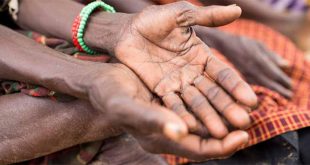A problem soon emerged: although formal power was vested in these Hutu faces, effective power remained in the hands of the Tutsi elites who had fought the war. But these Hutu leaders did not want ceremonial titles. They wanted to exercise real power and the prerogatives and privileges that go with it. And they knew (or believed) that the Tutsi-led (at that time even Tutsi-dominated) RPF could not survive without them.
So the Hutu faces of the regime and Tutsi power-holders behind it lacked a shared vision of national reconstruction. The alternative to hostile stalemate in this ethnic coalition government would have been a retreat to the exchange of material favours i.e. corruption. By giving individual Hutu politicians a free reign at official loot, Kagame/RPF would have kept them busy at self-enrichment.
But they would also have accumulated sufficient evidence of theft. So if anyone of them tried to challenge the system, they could be legitimately prosecuted for corruption. The trick would have been to keep a tight grip on the military to counter-balance power. Indeed, many African leaders, past and present, have successfully used this approach.
It seems to me that Kagame personally was either unable to appreciate the necessity of such a bargain and/or was unwilling to accept it as a method of management. There is something in his make-up, his personality that is incapable of such deals; a puritanical streak that drives him to the adherence to certain principles/values. This streak also gives him an authoritarian reputation. Rather than trade corruption for loyalty, Kagame just allowed the tensions between his Tutsi-led RPF and the Hutu leaders to escalate leading to a divorce.
Throughout the 1990s senior Hutu politicians fell out with the government. Always, they resigned and ran into exile clearly knowing that in so doing they were stripping the regime of legitimacy and strengthening the civil war then raging in the north east of the country. Kagame’s first mission was to defeat rebellion militarily and thereby demonstrate that a violent power-grab was impossible. This he achieved. But he could not stop the tide of Hutu elites turning against him and his government in droves.
As more and more Hutu politicians fell out with the government, Kagame and his colleagues must have realised that this strategy was not sustainable. The legitimacy of the government depended on the goodwill of a few influential Hutu elites they could not control. RPF needed a strategy where the cards of legitimacy were in its hands. Rather than rely on unreliable Hutu elites, the RPF decided to work directly with Hutu masses to win their hearts and minds.
There was not a single moment when such a decision was taken. It evolved gradually and I think out of necessity. But if there is a date to attach to it, it is when Kagame came out of the closet and accepted to become president in place of Pasteur Bizimungu. That decision set an entirely different tone in Rwanda. Initially the government derived legitimacy from ending the genocide, establishing security, curbing revenge killings (many Hutus had been told that an RPF power-grab would lead to their mass murder) and returning the refugees.
The presence of Hutu faces in top leadership positions also helped win over the hearts and minds of Hutu masses. But as the situation stabilised and senior Hutu politicians (Seth Sendashonga, Alex Rezinde, Pierre Rwigyema, Faustine Twagiramungu, Emmanuel Habyarimana, Bizimungu, to mention only but a few) were resigning in quick succession, the RPF began the delivery of public goods as the focal point of its search for legitimacy.
The strategy to seek performance-based legitimacy has had powerful implications on the organisation and exercise of political power in Rwanda. For such a strategy to work, the country had to build institutions on the basis of professional competence so that the state can deliver on its promises.
Henceforth, recruitment and promotion were to be based on merit. Yet many Hutu professionals had been ringleaders of the genocide and were therefore in jail or exile, many others had died defending Hutu power. The professionals available were the Tutsis diaspora returning from exile where they had worked for international organisations and foreign governments.
Insistence on merit could easily be seen as a disguised form of consolidating Tutsi power. Yet forging a semblance of ethnic accommodation by appointing every Hutu regardless of merit would create institutional incompetence and undermine state capabilities.
The RPF was no longer for appearances anymore (how it would be seen) but for substance (how its rule would be felt by ordinary people). As the government began to deliver, it pulled the rug from under the feet of ethnic populists. Save for standing on the platform of identity (Hutu power), critics of Kagame would find it difficult to fight him over public policy.
To deliver public goods and services effectively and efficiently, the RPF has had to make fighting corruption a corner stone of its governance strategy. Kagame has rigorously enforced an anti-corruption regime that has antagonised him with many sections of the Tutsi elite who have been its largest victims.
But such fights only win Kagame increasing admiration from many moderate and responsible Hutu leaders and Rwandan masses. And unlike in most of Africa where corruption charges are used to trim the wings of political rivals, Kagame has used it to ensure a government that delivers.
This brings me to the final lesson – democracy in Rwanda. According to American political theoretician Robert Dahl, democracy has two elements – participation and contestation. Participation refers to the ease with which citizens can organise and place their demands on the national political agenda.
The RPF has expanded participation through such local institutions as councils, national dialogue (umushikirano), farmers’ cooperatives and imihigo. Here, ordinary citizens can and do influence public policy. Contestation refers to the easy with which opponents of the government can organise to challenge its hold on power. Most political contention in Rwanda is over this issue.
There is limited political contestation in Rwanda especially the kind of adversarial competition we see elsewhere. One reason is because the government has entrenched a system of power-sharing among political parties. No political party, however popular, can take more than 50 percent of cabinet seats. This makes political parties find it more profitable to accommodate rather than to attack each other during elections. Although it has taken heat out of the electoral process, it has stabilised the country.
The other reason is government has closed space for anyone who seeks to use ethnic identity as the basis for organising political support. Political parties and media that offer a platform to this kind of politics get muzzled. These actions have armed critics with ammunition to denounce Kagame as a despot. Yet every reasonable person would agree these measures are absolutely necessary in Rwanda’s specific context of ethnic polarisation causing genocide.
To reform the power-structure in Rwanda so that the state serves the ordinary citizens, Kagame/RPF found that resistance is better if it is organised through the democratic process. It is elites who organise and control political parties, own and write in newspapers and appear on television and radio and who form “civil society” organisations. They use these platforms to promote their interests. Ordinary citizens are often integrated into these “democratic structures” – not as rights bearing members – but as clients of powerful individuals.
This way, conventional democratic processes tend to empower a few elites at the expense of the masses. To liberate the state and the masses from the power of elites, Kagame/RPF found themselves in the shoes of former Venezuela President, Hugo Chavez – fighting institutions conventionally seen as democratic. As Rwanda’s success has shown, that is a worthwhile battle in the war against the politics of patronage.
amwenda@independent.co.ug
 The Independent Uganda: You get the Truth we Pay the Price
The Independent Uganda: You get the Truth we Pay the Price



